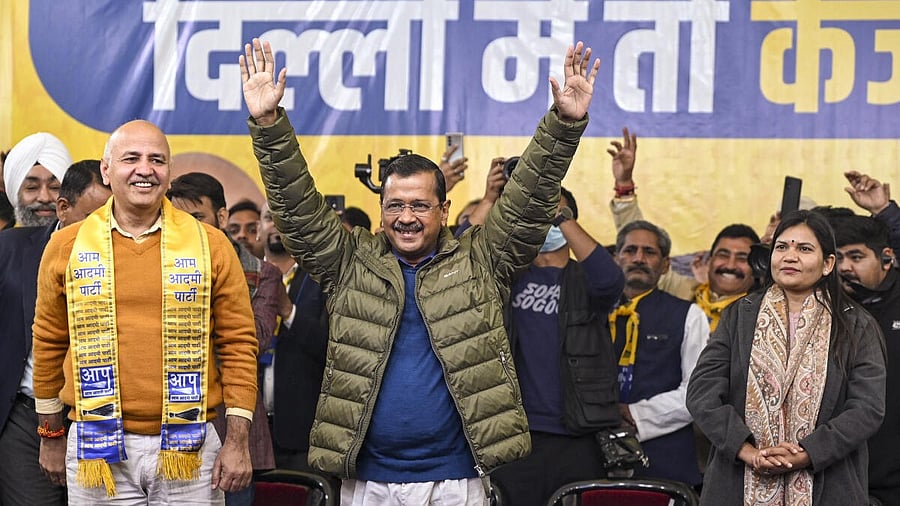
Aam Aadmi Party (AAP) National Convener Arvind Kejriwal during a public meeting in support of the party candidate from Jangpura constituency Manish Sisodia for the upcoming Delhi Assembly elections, in New Delhi, Sunday, Jan. 26, 2025.
Credit: PTI Photo
The fate of the Arvind Kejriwal-led Aam Aadmi Party (AAP), which will be decided on February 8 when the Delhi Assembly election results are declared, has ramifications far beyond the Bihar polls likely to take place by year-end; it will also impact Trinamool Congress chief Mamata Banerjee’s efforts to retain power when West Bengal goes to the polls in 2026.
Delhi has become the BJP's Achilles heel. It has been out of power for over 26 years despite winning all seven Lok Sabha seats here since 2014.
The domino effect of Delhi’s poll results is what makes it India’s political cynosure. Besides Bihar and West Bengal, Assembly polls are scheduled in Assam, Tamil Nadu, Puducherry, and Kerala in 2026, which are all expected to be keenly contested affairs.
Bihar Chief Minister Nitish Kumar, whose Janata Dal (United) (JDU) is one of the major crutches of the Narendra Modi government at the Centre, is so far playing an obedient ally. Kumar’s supporters insist that he holds all the aces, and any attempt to sideline him in the leadership game in the state could be counterproductive. The message is: Kumar is not Eknath Shinde.
No wave
A Bharatiya Janata Party (BJP) victory in Delhi will make its National Democratic Alliance (NDA) allies in Bihar not only defensive but will also subdue them in the bargaining game; especially so because the victory will be a hat-trick after winning Haryana and Maharashtra. However, for now, even Jitan Ram Manjhi’s Hindustani Awam Morcha, which currently has four MLAs, is seeking 40 of the total 243 seats in the allocation.
Much depends on the way the political winds are blowing in the national capital, where Kejriwal is fighting with his back to the wall, as the BJP, backed by the might of the all-powerful Centre, is leaving nothing to chance.
This time, thus far into the campaign, there isn’t a Kejriwal wave, nor does the BJP have tailwinds in its favour. There is a dip in the buzz favouring AAP, and remember, Prime Minister Narendra Modi is yet to start his Delhi campaign.
With the Lt Governor of Delhi becoming a powerful post in the new scheme of things, the battle ahead for AAP, which is also fighting a 10-year anti-incumbency, is not that easy.
National implications
As the Delhi battle is being fought between Modi and Kejriwal, the BJP's defeat will strengthen Kumar and Union minister Chirag Paswan's hands. Besides, the BJP's defeat would be a moral booster for the Opposition across India.
There is another aspect too. Kejriwal is an ambitious leader who is aspiring to be prime minister, and he has made known his ambition by fighting the Varanasi Lok Sabha seat against Modi in 2014.
Kumar and Banerjee too are aspiring to the top post but treading cautiously after realising that they cannot be prime minister without the backing of either the Congress or the BJP.
Kejriwal’s AAP is fighting with the two national parties simultaneously and, thus, has become the common target of both parties not only in Delhi but also in Punjab.
Kejriwal also faces a credibility problem in the opposition alliance for being ambivalent on its stand regarding secularism and minorities. Even if he wins Delhi and positions himself as the principal challenger to Modi, he is unlikely to get the backing of either Banerjee or Samajwadi Party chief Akhilesh Yadav, or Rashtriya Janata Dal leader Tejashwi Yadav. Kejriwal is seen more as a slippery customer.
Political irrelevance
The BJP has succeeded in making a host of regional parties irrelevant, including the AGP, the INLD, the Jannayak Janata Party, and the Janata Dal (Secular). It has broken the Shiv Sena and the NCP and is seeking to marginalise the BSP and the Biju Janata Dal.
Though AAP is in power in Punjab, a loss of power in Delhi could prove fatal for the party and Kejriwal’s political ambitions.
(Sunil Gatade and Venkatesh Kesari are senior journalists.)
Disclaimer: The views expressed above are the author's own. They do not necessarily reflect the views of DH.